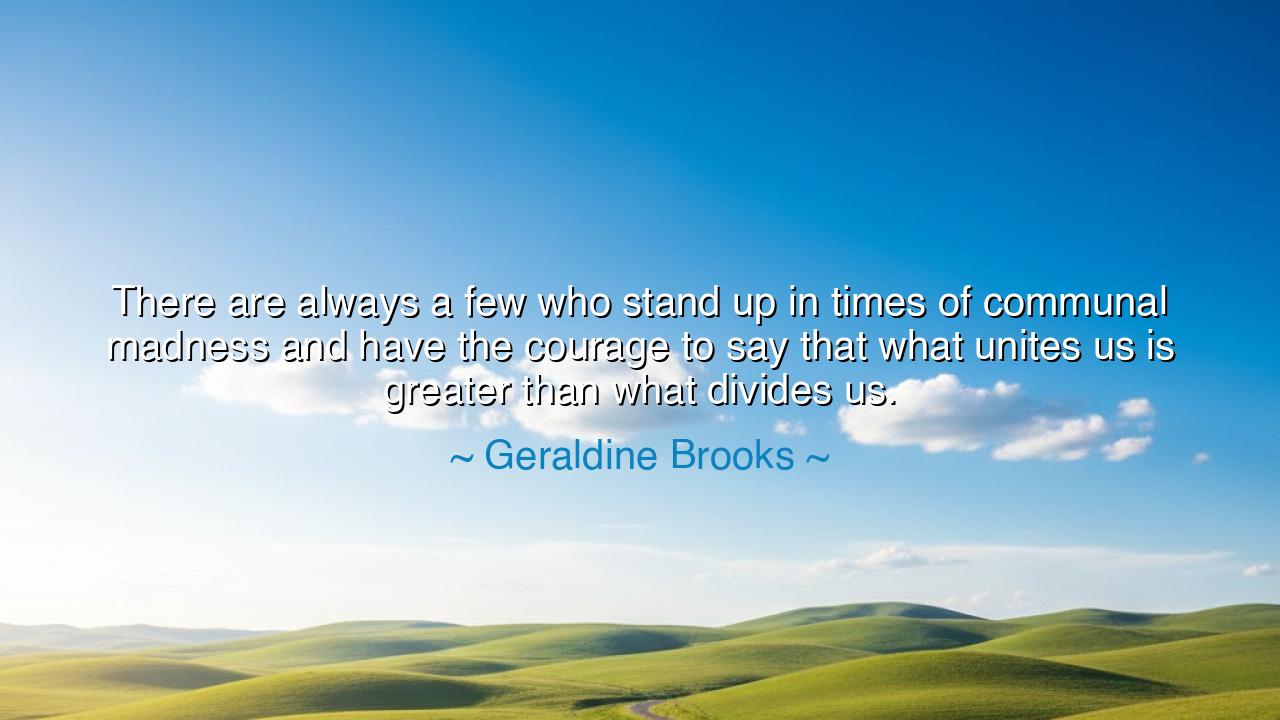
There are always a few who stand up in times of communal madness
There are always a few who stand up in times of communal madness and have the courage to say that what unites us is greater than what divides us.






“There are always a few who stand up in times of communal madness and have the courage to say that what unites us is greater than what divides us.” Thus spoke Geraldine Brooks, a storyteller of deep humanity, whose words resound like a trumpet call across the ages. In this saying, she honors the rare souls who, amid chaos and hatred, choose the harder path — the path of courage, of truth, of unity. For when the world descends into madness, when fear and anger drive nations, religions, or tribes to turn against one another, it is these few who remind us that we share one breath, one earth, one destiny. They stand as lights in the tempest, whispering the eternal truth that what unites us is greater, nobler, and more enduring than what divides us.
The origin of these words lies not in politics or philosophy alone, but in the timeless struggle of humanity against its own darker impulses. Brooks, an observer of both history and the human heart, has written of communities torn apart by plague, by war, by suspicion. She has seen how easily fear becomes hatred, and how swiftly hatred devours reason. Yet, she also reminds us that even in the darkest nights of civilization, there are always those few — men and women of conscience — who stand against the tide. Their names may be forgotten by history, but their spirit is eternal. They are the guardians of our shared humanity.
Consider the tale of Desmond Tutu, the South African archbishop who, during the long years of apartheid, refused to let hatred rule his heart. Surrounded by violence, anger, and injustice, he still proclaimed, “We are made for togetherness.” His voice trembled at times, yet it never faltered. When others called for revenge, he called for reconciliation. When bitterness burned the land, he watered it with forgiveness. He was one of the few who stood up in a time of communal madness, reminding all that unity, compassion, and love are stronger than any wall of division. His courage was not the roar of power, but the quiet steadiness of moral strength — the same courage Brooks praises in her words.
Such courage is not common, for it demands more than strength — it requires vision. To stand up for unity in times of hatred is to risk isolation, mockery, and even death. It is to face the fury of the mob with only the shield of truth. Yet history shows that all great transformations begin with such acts of defiance. Think of Mahatma Gandhi, who, amid the turmoil of empire and sectarian rage, declared that love is the only force capable of defeating hate. Or Martin Luther King Jr., who stood before a divided nation and proclaimed, “We must live together as brothers or perish together as fools.” Each was one of the few — a solitary voice rising above the storm, daring to remind a broken world of its shared soul.
But Brooks’s words speak not only to heroes of the past — they speak to us now. For the communal madness she describes is not a relic of history; it lives still, in every age, in every society where people forget the humanity of those who differ from them. It takes many forms — political division, racial strife, religious intolerance, digital outrage — yet its essence is the same: the blindness of “us” versus “them.” And always, in such times, the need for the few — the brave, the clear-sighted — returns. It is they who lift the veil of hatred and remind the people: “We are one human family.”
Courage, in this sense, is not born of strength, but of love. To see one’s enemy as a brother, to answer anger with empathy — this is the truest form of heroism. It does not shout; it endures. It stands firm not because it is unafraid, but because it loves what is good more than it fears what is evil. Those who act with this courage do not wait for the world to change; they become the change. They plant seeds of understanding in the barren soil of conflict, and though the harvest may come long after they are gone, their faith in humanity does not waver.
Therefore, my children, learn from this sacred teaching: in every age of darkness, be among the few. When hatred divides, let your words heal. When fear blinds others, let your heart see clearly. When others speak of enemies, speak of neighbors. Do not be deceived by the false strength of anger — for it is unity, not division, that sustains the world. Remember that the hands that build bridges are far more powerful than the ones that tear them down.
And let Geraldine Brooks’s words be written upon your spirit: “What unites us is greater than what divides us.” For this is not merely a truth — it is a calling. In the face of every storm of madness, dare to be the calm. In every age of shouting, dare to speak gently. And in every time of hatred, dare — with unyielding courage — to love. For it is the few who stand up that keep the world from falling apart, and it is their faith in unity that will, at last, redeem us all.






AAdministratorAdministrator
Welcome, honored guests. Please leave a comment, we will respond soon